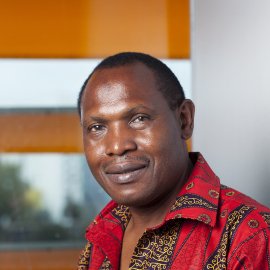History, The Catholic University of Eastern Africa, Kenya

Octobre 2015 à Décembre 2015
Professor Samuel Alfayo Nyanchoga from Kenya holds a BA Hons and a MA (Hist) from Nairobi University, a PhD from the Kenyatta University. He was a Fulbright Scholar at the Boston College. He is the Dean Faculty of Arts and Social Sciences, and served as Director of The Institute for Regional Integration and Development. He is now Director of Academic Programmes, and Head of the History Department. He served as resource person among many Research Centers in Europe, Africa and United States and as consultant with NGO’s and public commissions on education and human rights. He was a Commissioned Historian for General Labour history of Africa under ILO and Institute of Social History, Amsterdam, The Netherlands. He is editorial board member of the Journal of Humanities and Social Sciences; the Africa Humanities and Social Sciences Journal; the Eastern African Journal of Historical and Social Sciences Research. He is head the HEREGO local Research; IRD research on Identities and Slavery Heritage in Contemporary Kenya; member of the Corus Research International Team on Environment and Human Rights. He also chaired many academic associations such as the Association of Third World Studies 2008-2009; the Kenya Historical Association 2008-2009; the Kenya/American Studies Association (2000). He is a member of CODESRIA and Teachers Without Borders. He is published widely and attended many international and local academic conferences. Research fields include heritage and cultural studies, security, democratization and governance in Africa
"Slave Heritage, Marginalisation and Conflict at the Kenya Coast"
The history of slavery at Kenya Coast after abolition is characterized by crucial legacies in the social and political structures and to the logic of patron client relations with the descendants of former slave masters. In these settlements exist structures of power relations between the descendants of former freed slaves and those of former salve master mostly reinforced by ideology, economy, and legal instruments. This translates to exclusion, marginalization and conflicts. The study opens a new paradigm of investigation and bringing out new insights on slavery heritage, marginalization, conflicts and survival of this category in an environment that is xenophobic. While heritage conservationist and policy instrumentalists focus on former slave spheres as avenues of community empowerment and enhancement of livelihoods, there is lack of interrogation how these heritages dialogue with each other, perpetuate dispossession and contribute to the resurgence of social conflicts. This study explicates the use of heritage as a vestige of stigmatization, peripherization and exclusion rather than as means of empowerment, as well as a tool of legitimating a social, political and economic classificatory system between the two distinct social categories. Despite many years of independence and promulgation of the 2010 Constitution no attempts have been made to give citizenship to descendants of former freed slaves. As their population increase, the limited land allocated to them can no longer sustain them. There is also the failure of Kenya government to foster integration of these communities into the national fabric; empower them politically, socially and economically. There is a logical and empirical connection between slavery, dispossession and increase of radicalization of the marginalized.